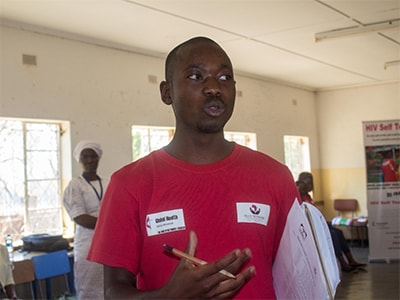
World AIDS Day was Sunday, December 1st, but for 37 million people around the world, living with HIV and AIDS is an everyday reality. Millions who don’t know their status are at risk of infection or spreading infection, which also affects the millions they support and nurture through family and community life. The United Nations theme for World AIDS Day 2019 is “Communities make the difference.”
People of every age group are affected by HIV and AIDS but in many places, young people are disproportionately affected. The Abundant Health Initiative (Advance # 3021770) supports small projects that reach out to young people through communities throughout the world. All have sacred worth but are affected by our stigma and judgement. In communities where Global Health works, our partners hear: “Stigma keeps many of us from being tested and treated.…Fear of rejection keeps us hidden…To lose our community is to lose our lives.”
Stigma shuts the door to HIV counseling and testing for many. Fear of the results and fear of leaked information keeps trust levels low. In the silence, myths grow and infection spreads.
In 2017, staff of Kissy UMC Hospital and UMC school children joined a march through their capital - Freetown, Sierra Leone - to promote awareness about rising rates of HIV cases, especially among young people. The turnout was high. HIV testing booths were positioned along the route. The city’s mayor encouraged people to embrace those living with HIV. “Stigma must stop”, he said. “When stigma is reduced, there will surely be a reduction of HIV transmission.”
Felister, a successful farmer and the mother of two HIV negative children in Malawi, is HIV positive. She and her husband were both positive when they married, but sadly, he abandoned her when their children were young. Though devastated, Felister started life all over again and has done very well. She is now rearing chickens and pigs. She also grows potatoes. She knows that being HIV-positive is not the end of life. Taking the medication properly is what makes her body strong. She attends clinic regularly and receives community support. Felister is determined to nurture her children and provide for them on her small farm in northern Malawi.
Churches and communities can respond in many ways. Their leadership and advocacy keep people at the center. Pastors, church members, teachers, neighbors, peer educators, networks of people living with or affected by HIV – and you too – can make a difference through your prayers, welcome and love. People at risk for HIV infection may also experience mental health concerns and substance use disorder, leading to lowered inhibitions in relationships. Even loneliness and simply the need to be loved or connected with someone can lower inhibitions. Young people who have no place to stay may sometimes engage in risky sexual encounters in exchange for shelter and the cost of food.
Farai Danny Mhlanga is a Peer Educator at Africa University in Zimbabwe. In this role, he and his Peer Network have reached out to people of different cultures and traditions, people like themselves but also some who are marginalized with whom they wouldn’t normally associate. Together they’ve developed leadership and communication skills – like debate, dance, drama, music and public speaking – to engage young adults on this difficult subject. It has taught them to be the change Africa needs. It’s given them hope that this epidemic can be stopped.
excerpt from an article by Kathleen Griffith, writer, General Board of Global Ministries
The Advance is the accountable, designated-giving arm of The United Methodist Church. The Advance invites contributors to designate support for projects related to the General Board of Global Ministries. Individuals, local churches, organizations, districts and annual conferences may donate to The Advance. One hundred percent of every gift to The Advance goes to the project selected by the giver. Gifts to missionaries support the entire missionary community.
A community awareness meeting in Malawi offers information on what HIV services are available and how to access them. Photo: WorldHope Corps
A community awareness meeting in Malawi offers information on what HIV services are available and how to access them. Photo: WorldHope Corps





